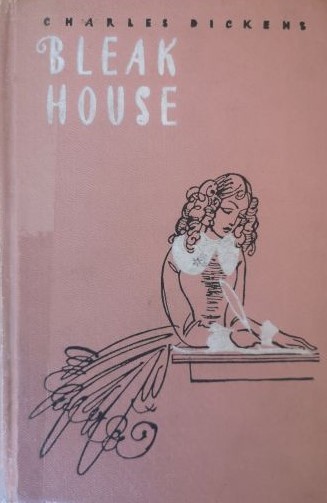
- Išparduota

- Autorius: Charles Dickens
- Metai: 1957
- Puslapiai: 932
- Formatas: 14 x 20 cm, kieti viršeliai
- Kalba: Anglų
Atsiliepimai
Aprašymas
Murder most foul, unscrupulous lawyers, courtroom drama, thrilling chases, a relentless detective, pathetic deathbed scenes – it must be the latest John Grisham, right? Well, not quite. On Charlotte’s suggestion, I picked up Charles Dickens’ Bleak House this past month. I have been trying to read one classic work of literature a year, and Dickens was this year’s author. I have always enjoyed the sprawling, multi-charactered approach to stories that you find in many 19th century novels. Dickens’ Bleak House is nothing if not layered. The story is told from a variety of points of view, most prominently, that of Esther Summerson. Esther knows neither her mother nor her father, and is raised by her cruel godmother, who neglects to let Esther know that her mother is Lady Dedlock, wife of a wealthy landholder, Esther being the fruit of an earlier romantic entanglement. When she reaches her majority, Esther is taken in by the noble and kindhearted John Jarndyce, to serve as a companion to his ward Ada. Esther, Ada, and Ada’s cousin Richard all settle down to live with Jarndyce, and things seem relatively happy for them, until the wind shifts to the East, and young Richard finds himself embroiled in the inescapable tangles of the long-running Chancery Court case Jarndyce v. Jarndyce. It is a matter of contested wills, and the case has already run through several generations and much of the Jarndyce inheritance. To no avail, John Jarndyce, Esther, and Ada all try to dissuade Richard from becoming caught up in the case. As in most of his works, Dickens here points a critical finger at some of the absurdities of English society. In particular, the legal system and its practitioners come off poorly at best. Class divisions also bear some of the brunt of Dickens’ critique, especially the “do good” upper class ladies who sweep into the houses of the poor unasked and try to raise their standards of living. Mostly though, Bleak House is a fascinating story filled with memorable characters and scenes of life in 19th century England, both the cities and the countryside. It is not a quick read, you really need to pay attention to the story, but this attention pays off in the richness of character and description that are hallmarks of Dickens’ fiction.
- Kaina: 10,59 €
Perskaityta knyga:
Nenauja knyga, kurią parduoda privatus žmogus.
Knygą išsiųs knygos pardavėjas Gaja.
Pardavėjo reitingas: 100%
- Autorius: Charles Dickens
- Metai: 1957
- Puslapiai: 932
- Formatas: 14 x 20 cm, kieti viršeliai
- Kalba: Anglų
Murder most foul, unscrupulous lawyers, courtroom drama, thrilling chases, a relentless detective, pathetic deathbed scenes – it must be the latest John Grisham, right? Well, not quite. On Charlotte’s suggestion, I picked up Charles Dickens’ Bleak House this past month. I have been trying to read one classic work of literature a year, and Dickens was this year’s author. I have always enjoyed the sprawling, multi-charactered approach to stories that you find in many 19th century novels. Dickens’ Bleak House is nothing if not layered. The story is told from a variety of points of view, most prominently, that of Esther Summerson. Esther knows neither her mother nor her father, and is raised by her cruel godmother, who neglects to let Esther know that her mother is Lady Dedlock, wife of a wealthy landholder, Esther being the fruit of an earlier romantic entanglement. When she reaches her majority, Esther is taken in by the noble and kindhearted John Jarndyce, to serve as a companion to his ward Ada. Esther, Ada, and Ada’s cousin Richard all settle down to live with Jarndyce, and things seem relatively happy for them, until the wind shifts to the East, and young Richard finds himself embroiled in the inescapable tangles of the long-running Chancery Court case Jarndyce v. Jarndyce. It is a matter of contested wills, and the case has already run through several generations and much of the Jarndyce inheritance. To no avail, John Jarndyce, Esther, and Ada all try to dissuade Richard from becoming caught up in the case. As in most of his works, Dickens here points a critical finger at some of the absurdities of English society. In particular, the legal system and its practitioners come off poorly at best. Class divisions also bear some of the brunt of Dickens’ critique, especially the “do good” upper class ladies who sweep into the houses of the poor unasked and try to raise their standards of living. Mostly though, Bleak House is a fascinating story filled with memorable characters and scenes of life in 19th century England, both the cities and the countryside. It is not a quick read, you really need to pay attention to the story, but this attention pays off in the richness of character and description that are hallmarks of Dickens’ fiction.



Atsiliepimai